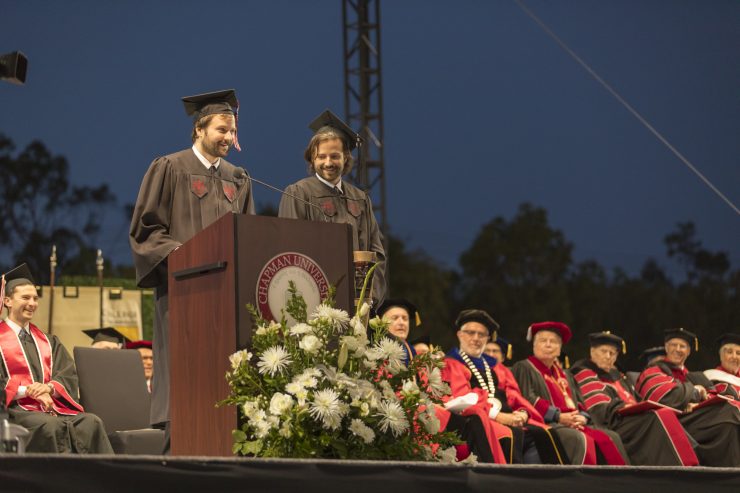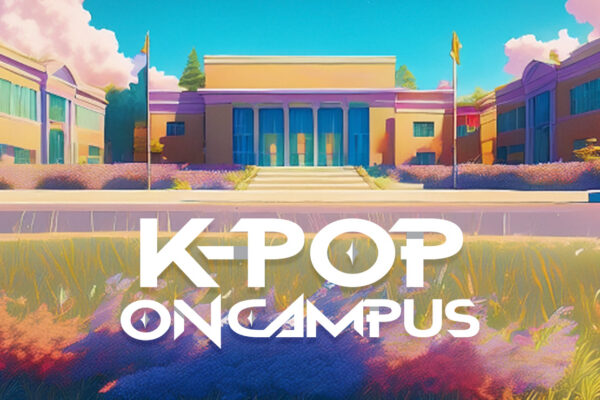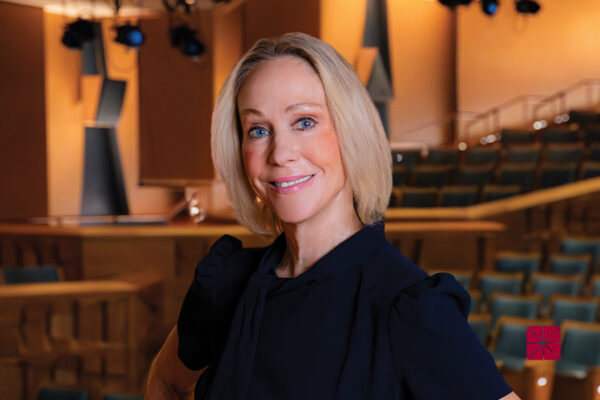Congratulations! You did it. You graduated.
Maybe you have a job or an internship lined up. Or maybe you and your friends are building something new from the ground up. Or maybe you’re taking some time to consider the next step.
Whatever the case, here at Chapman, we’re proud of you and what you’ve accomplished, and we wanted to offer you one last gift. Here are ten golden nuggets of advice from among the past 50 years of commencement speeches at Chapman University, starting off with this year’s honored guests, Chapman’s own — The Duffer Brothers.
Matt and Ross Duffer ‘07: The Process Is the Best Part.
Creators of Netflix Hit, “Stranger Things”
At last Friday’s Closing Convocation Ceremony for the class of 2019, Chapman alumni Matt and Ross Duffer shared some hard-earned experience and wisdom with the graduating class, diving into topics like adjusting to life on the West Coast after moving from North Carolina to the importance of working hard and working passionately.
Matt: “Success doesn’t amplify anything, it doesn’t make you happier, it doesn’t make you more confident. The process of doing the thing you love to do is what makes you happy. Working with your collaborators, sharing experiences with your friends, that feeling of making something good together that’s what really matters. But all that the other stuff all the stuff that comes as a result of your work that’s just noise.”
Ross: “The first act is over you’re just now moving into the second act. The second act: that’s the best part. You’re Marty McFly and you just went back in time. You’re Indiana Jones and you’ve just headed out in search of the Lost Ark. Things are about to get really tricky and really cool.”
Larry Wilmore: Embrace Your Uniqueness.
Emmy Award-Winning Producer, Actor, Comedian, Writer and Former Host of “The Nightly Show”
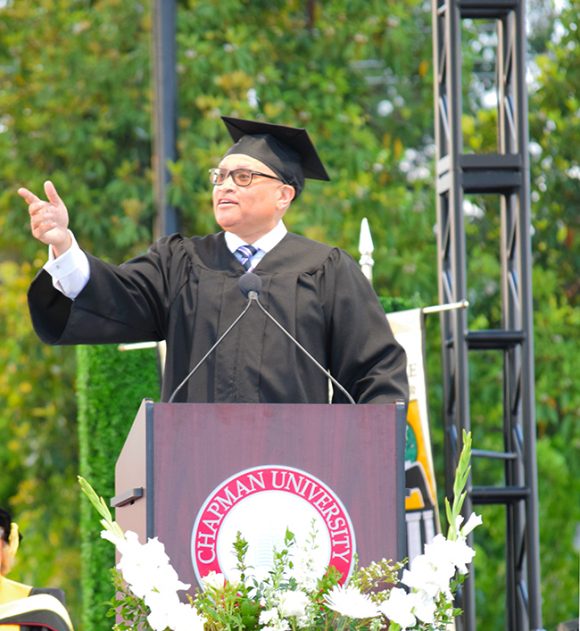 In 2018, the former writer and producer of “The Fresh Prince of Bel-Air” and host of “The Nightly Show” shared his wisdom and humor with the graduating class, including a story about how he almost attended Chapman University and an impactful essay about overcoming fear.
In 2018, the former writer and producer of “The Fresh Prince of Bel-Air” and host of “The Nightly Show” shared his wisdom and humor with the graduating class, including a story about how he almost attended Chapman University and an impactful essay about overcoming fear.
“Don’t just look at your life’s work in terms of what you can get out of it. Instead, approach it in terms of what you can put into it. Make a contribution in everything you do. Pour your passion, love, desire, integrity, intelligence and generosity of spirit into a world that desperately needs it.”
“Know that whatever your authentic self is. Whatever it is that makes you different and makes you stand out, whatever might make you the object of ridicule from others or might cause you fear or shame — embrace that.”
Watch the 2018 Closing Convocation Ceremony »
Larry Billman: You Have the Power to Inspire Others.
Writer/Director and Producer of Disney Resort Entertainment Worldwide
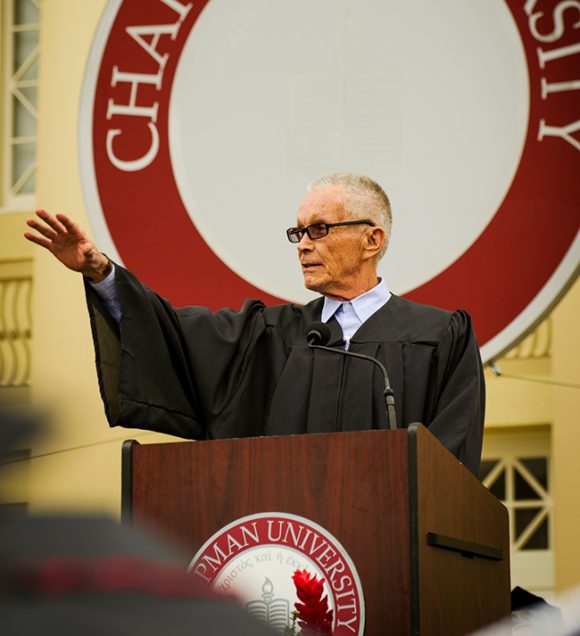 During his speech in 2012, Billman emphasized the importance of inspiring others.
During his speech in 2012, Billman emphasized the importance of inspiring others.
“We all get excited when a celebrity is in the house, right? I remember the day Walt Disney came to my show in Las Vegas and everyone was like, ‘Ooh, Walt Disney’s in the house.’
“But listen to this story: There’s an old lady. She lives on a fixed income. But she wants to see your show. She’s saved the money. She’s gone without some luxuries. She’s checked out the bus schedule and waited so long to see you in the show. And she’ll be here — tonight. Every performance is that night. And she’s there.
“And you have to realize you have the power to inspire others — as someone else inspired you. What a wonderful responsibility.”
Jerry Lewis: There’s Nothing You Cannot Do.
Actor, Singer, Filmmaker, Humanitarian and Comedy Legend
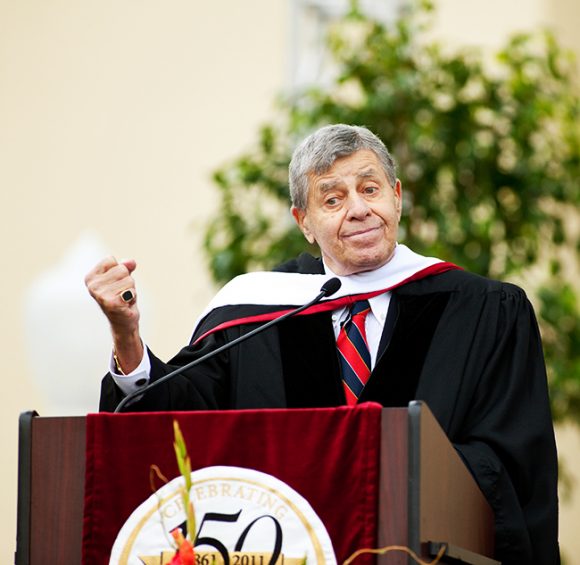 In 2011, the legendary comedian, nicknamed “The King of Comedy” and ranked with Charlie Chaplin and Buster Keaton among others, joked on stage before explaining the importance of looking out for yourself and others.
In 2011, the legendary comedian, nicknamed “The King of Comedy” and ranked with Charlie Chaplin and Buster Keaton among others, joked on stage before explaining the importance of looking out for yourself and others.
“You are number one. You must never ever let that change. You are number one selfishly, and selflessly. But you’ve got to concern yourself with what happens to you out there, with a lot of people who probably don’t really care. But that’s humanity. As much as I love it, it’s got some warts, and some tissue, and some things that come about because we didn’t have our minds set. Now you can do that, as long as you remember when you go out there, there isn’t anything you cannot do, if you want to do it badly enough.”
Dr. Linda Darling-Hammond: You Are Responsible for More Than Just Yourself.
President of the Learning Policy Institute, Charles E. Ducommun Professor of Education Emeritus at Stanford University
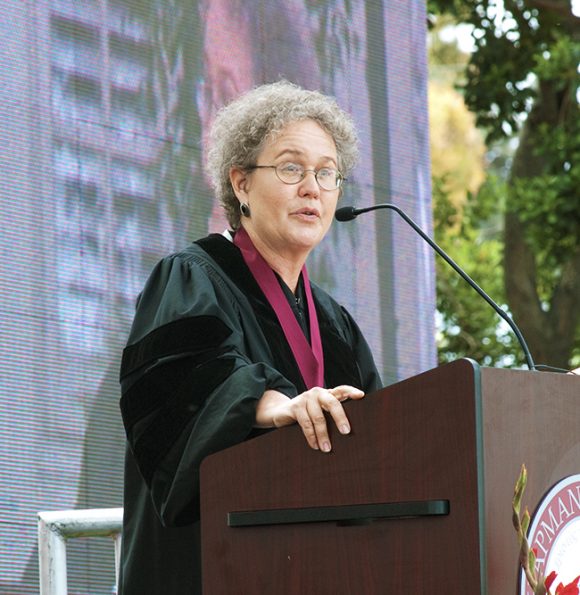 In 2010, Dr. Darling-Hammond — who was reportedly among candidates for United States Secretary of Education in the Obama administration — explained her philosophy on what makes a profession, and how it relates to helping others.
In 2010, Dr. Darling-Hammond — who was reportedly among candidates for United States Secretary of Education in the Obama administration — explained her philosophy on what makes a profession, and how it relates to helping others.
“Moral commitment, and ethical commitment, to use knowledge to do what is in the best interest of those you serve. Not what is the cheapest, easiest, or most convenient thing to do. In all professions that forms the beginning. The hypocritic oath in medicine, the oath in education to be committed to children and their families, to honesty, safety, fairness, and good value in business, to doing what is right in professions like law and others.
“The responsibility, to define and transmit, and enforce good standards of practice in your field. To help others get better. As a professional you are not responsible only for yourself, you’re responsible, for those you serve and those you work with.”
Dr. Paul Davies: Your Mind Is Your Greatest Tool.
Director of the Beyond Center for Fundamental Concepts in Science at Arizona State University
In 2009, the English physicist, writer and broadcaster who contributed to the field of quantum field theory described his philosophy on science and religion to the graduating class.
“Not only is your body literally made of stardust, cooked in the nuclear fantasies of a bygone stellar generation — your brains are wired to make sense of it all. That the universe has generated not only richness, diversity and complexity, but beings that can connect to and resonate with the abstract underpinnings of reality, is surely a fact of the deepest significance. And it generated in me I hope in you, certainly many of my colleagues, what Einstein called a cosmic religious feeling. A sense that the universe isn’t arbitrarily absurd, but there is a meaning, a scheme, behind things, that science can uncover. Your greatest asset then is your mind, and its extraordinary ability to comprehend the world and be creative. Please don’t take your mind for granted.”
The Hon. Loretta Sanchez ‘82: Work Hard and Strive for Community.
Served in the U.S. House of Representatives from 1997 to 2017
 In 2002, the congressional state representative, known as a defender of education and access to early childhood programming and the championing of women in combat roles for the military, shared the importance of striving for peace. She also spoke about her experience at Chapman and how — at some points — she was enrolled in double the normal course load in order to graduate on time.
In 2002, the congressional state representative, known as a defender of education and access to early childhood programming and the championing of women in combat roles for the military, shared the importance of striving for peace. She also spoke about her experience at Chapman and how — at some points — she was enrolled in double the normal course load in order to graduate on time.
“Boy, was I happy. The experience [of enrolling in so many units] taught me that if you find something you really like, success is a natural byproduct.”
“When we examine our world, we will be judged not on whether we won wars, but how we have strived for peace, for community and for the reverence of life.”
John C. Crean: Your Possibilities Are Endless.
Half of the Namesake for Chapman’s Crean College of Health and Behavioral Sciences
In 1997, the businessman known for his extraordinary philanthropy and the founding of Fleetwood Enterprises in the 1950s shared his views on the limitless possibilities open to Chapman graduates. He and his wife, Donna Crean, generously supported a multitude of educational initiatives at Chapman.
“There is a big, bold, bright world in front of you. The greatest invention is yet to be invented, The greatest discovery is yet to be discovered. The greatest company is yet to be built. The greatest book is yet to be written and the greatest life is yet to be lived.”
Sol M. Linowitz: Humanity Makes You Stronger.
Businessman, Lawyer and Diplomat
In 1979, the recipient of the Presidential Medal of Freedom spoke to Chapman students about responsibility to the entire world. The diplomat is known for helping to negotiate the return of the Panama Canal to Panama under President Jimmy Carter’s direction.
“Together we’re facing a great responsibility at a critical moment in world history. . .we’re not going to discharge that responsibility just by building larger missiles or making more powerful warheads. We’re not going to do it by issuing new or more eloquent statements. We will only do it by remembering who we are and what we are. By tapping the very deepest within us as a people. By dedicating ourselves to the fulfillment of our mission as a beacon of hope for ourselves and the other human beings on this Earth.”
Norman Cousins: We Can Solve Any Man Made Problem.
American Political Journalist, Author, Professor and World Peace Advocate
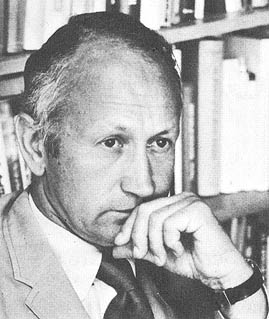 In 1968, during the height of the Vietnam War, the famous journalist discussed the need for intelligent decision making to benefit all humans. Among Cousins’ numerous accomplishments was his use as an unofficial intermediary by President John F. Kennedy during the 1962 Cuban Missile Crisis.
In 1968, during the height of the Vietnam War, the famous journalist discussed the need for intelligent decision making to benefit all humans. Among Cousins’ numerous accomplishments was his use as an unofficial intermediary by President John F. Kennedy during the 1962 Cuban Missile Crisis.
“I cannot bring myself to believe that there is any problem that is made by man that is not within the reach of man to solve. We are not called upon in the world today to do the impossible. We are not called upon to raise the plains, or level the mountain, or scoop out the seas or rearrange the stars in the sky.
“We are called upon to make decisions. We are called upon to use the gift of intelligence in order to safeguard and ennoble the human estate. War is an invention of the human mind. The human mind can invent peace.”
If you’d like to experience any of these commencement speeches in their full form, visit the Leatherby Libraries’ Frank Mt. Pleasant Library of Special Collections & Archives.
